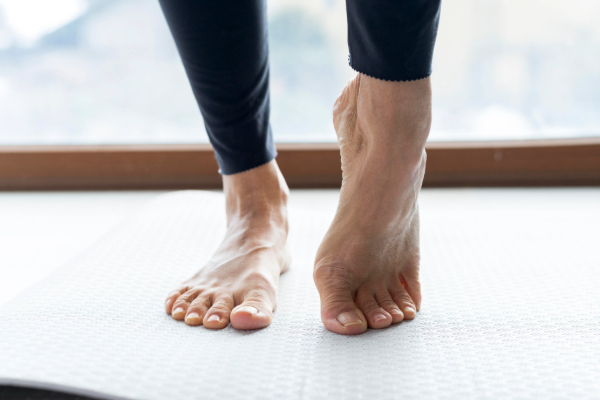It’s National Foot Health Week!

It’s that time of the year again, from the 22nd till the 28th of April, when we stop and celebrate the often-overlooked, unsung heroes of our body – our feet!
But this week isn’t just about pampering, Foot Health Week is also about acknowledging the crucial role our feet play in keeping us mobile and healthy, what to look out for and how to care for them.
The Importance of Foot Health
Our feet are the foundation of our body, quite literally. They bear the weight of our entire body and facilitate our mobility, allowing us to go about our day-to-day lives.
However, despite their importance, feet don’t often receive the attention they deserve, even when problems arise. If you had a toothache, you would call the dentist. If you had trouble with your hearing, then you would visit an audiologist. So, why must our feet suffer? Your feet are no less of a priority, and National Feet Week serves as a reminder to give your feet the care and attention they need.
Common Foot Ailments to Look out For
Athlete’s Foot
This fungal infection can cause a lot of discomfort and embarrassment due to the itching, redness and cracking of the skin that comes with it, especially in the summer when our feet are often more exposed. Without athletes foot treatment, the infection can spread to other parts of the foot and even to other people. Persistent scratching can also lead to secondary bacterial infections.
Plantar Fasciitis
Inflammation of the tissue that runs across the bottom of the foot can cause intense pain around the heel area. The pain is always just under the foot and it can radiate around the heel bone as well as up into the medial longitudinal arch area, especially in the morning or after prolonged periods of rest. This is called plantar fasciitis (also known as Policeman’s Heel) and ignoring it can result in chronic pain, restriction and difficulty with walking or standing for extended durations. Without Shockwave Therapy or other advanced plantar fasciitis treatments, the condition may lead to changes in gait and posture, causing potential secondary issues such as knee, hip, or back pain.
Ingrown Toenails
Nails that grow into the surrounding skin can cause significant discomfort, pain, redness and swelling. If untreated, ingrown toenails may become infected, leading to more severe pain and potential issues including abscess formation or cellulitis, a serious bacterial skin infection. In severe cases, neglected ingrown toenails may require surgical intervention.
Bunions
Bunions, mostly hereditary, are bony bumps that develop at the base of the big toe, caused by an imbalance of the muscles. One muscle will have a mechanical advantage over the other and pulls the big toe over, creating the 'archer's bow' shape due to the deviation. They can cause a considerable amount of pain and deformity, making it difficult to find comfortable footwear. Without proper treatment, bunions may progressively worsen, causing increased pain, inflammation and difficulty walking. Over time, untreated bunions may result in other foot problems such as hammertoes, corns, or calluses and impairing foot function.
Basic Foot Care Routines
Taking care of your feet doesn’t have to be complicated. So, here are some simple, yet effective steps you can take to keep your feet looking their best, prevent and relieve common foot problems:
Keep Them Clean and Dry
Wash your feet daily with warm water and mild soap, making sure to thoroughly dry them, especially between the toes to prevent fungal infections.
Moisturise Regularly
Apply a moisturising cream or lotion to keep your skin soft and prevent dryness and cracking.
Look After Your Nails
Pay close attention to your nails and regularly file them with an emery board, following the shape of the nail that their Podiatrist has cut. Be sure not to file them too short to prevent pain and infection.
Wear Comfortable Shoes
Opt for shoes that provide proper support and fit well. Avoid wearing high heels or ill-fitting shoes for extended periods to prevent foot pain and deformities. It’s important to also get your feet properly measured. All too often, adults wear shoes that are too tight/incorrect size. When was the last time that anyone offered to measure your foot as an adult when shopping for shoes? If shoes are too tight the nail can become impacted or damaged, which then could allow fungal spores to penetrate the nail.
Practice Good Foot Hygiene
Rotate your footwear and never wear the same pair of shoes for two days running. It will take the inner lining of a shoe 48 hours to dry out from one day’s wear. Again, this is often the cause of fungal spores forming in the inner lining of the shoe. Be like Imelda Marcos, have plenty of pairs of shoes! This applies also to those who participate in sports more than once a week – and don’t forget slippers, more than one pair is required.
Wear clean socks daily, preferably made from natural materials, i.e. 100% cotton socks or bamboo and avoid walking barefoot in public places to reduce the risk of infection.
The Role of Podiatry Appointments
While taking the time to look after your feet at home is a positive step, it's essential to acknowledge that these routines and remedies may not cover all bases when it comes to preventing or addressing foot issues.
Some particular or progressive conditions demand professional evaluation and intervention from a qualified podiatrist. No foot or ailment is the same! Which is why our podiatrists offer personalised guidance and access to advanced treatments and surgeries tailored to your needs.
By being proactive when it comes to foot health and giving your feet the love and attention they deserve, you can ensure they stay happy, healthy and ready for anything!
Are you experiencing frustrating foot problems? Don't wait until they worsen.
To give your feet the care they require, book an appointment at our New Forest podiatry clinic. Click here or call 02380 814903 to schedule your visit.


